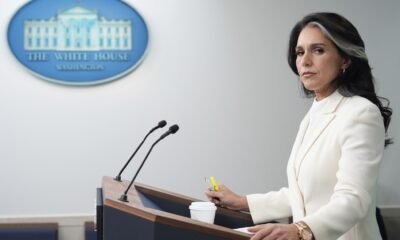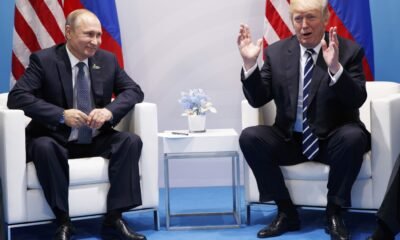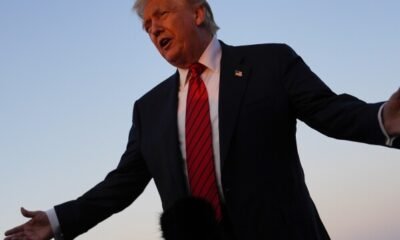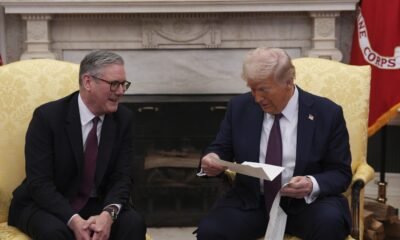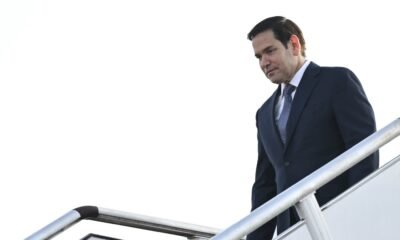Top Stories
College Basketball Coach Blames Barack Obama For ‘Dividing’ United States
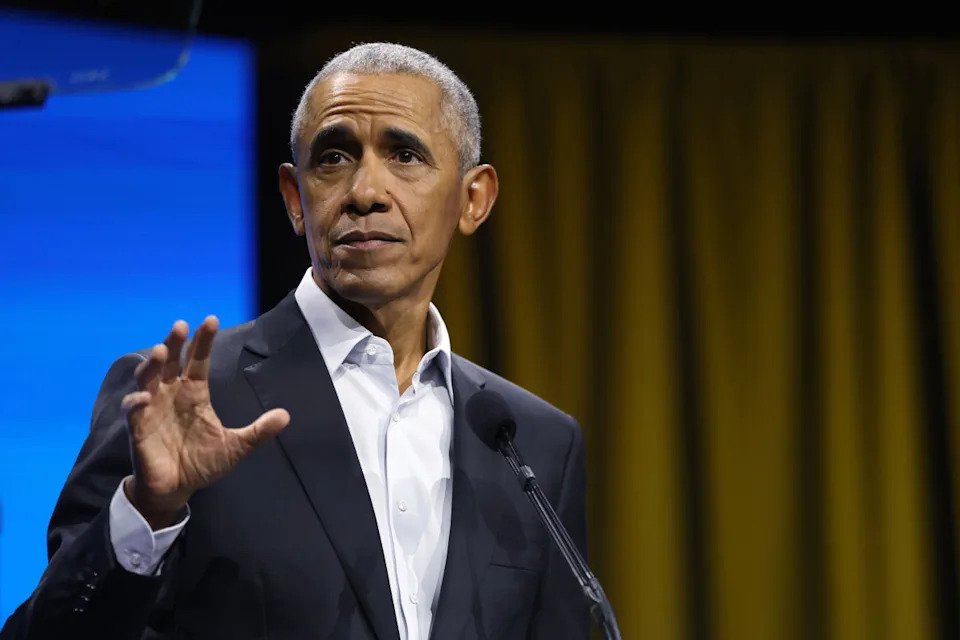
College Basketball Coach Blames Barack Obama For ‘Dividing’ United States originally appeared on The Spun.
For the second time this week, Barack Obama has been called out by Auburn basketball coach Bruce Pearl.
Pearl’s feud with Obama started earlier this week when the former president of the United States shared a New York Times article about the children in Gaza. Obama’s social media post included this message: “While a lasting resolution to the crisis in Gaza must involve a return of all hostages and a cessation of Israel’s military operations, these articles underscore the immediate need for action to be taken to prevent the travesty of innocent people dying of preventable starvation.”
Shortly after Obama shared this message with the public, he received a harsh reply from Pearl.
“You gave billions to Iran and Hamas creating this mess and not one word from you calling for THEM to release the hostages, surrender and end the War,” Pearl wrote on X. “Tell Hamas to 1) Quit stealing and reselling aid 2) Stop attacking GHF workers who are feeding Gazans. 3) Leave and end suffering.”
Pearl wasn’t done criticizing Obama. He had an awful lot to say about the 44th U.S. president during an appearance on OutKick’s “Don’t @ Me with Dan Dakich.”
NEW YORK, NEW YORK – NOVEMBER 17: Former U.S. President Barack Obama speaks at a Democracy Forum event held by the Obama Foundation at the Javits Center on November 17, 2022 in New York City. The all day event featured speakers from a variety of backgrounds conversing on the state of global democracy and opportunities for the next generation of global leaders. (Photo by Spencer Platt/Getty Images)Spencer Platt/Getty Images
The longtime college basketball coach suggested that Obama is responsible for America being so divided right now.
“I get so frustrated when I hear what a terrible country we are or how racist we are, how this is not the land of opportunity for everybody,” Pearl said, via Fox News Digital. “Look, we’ve got a lot to work on, and there is racism that absolutely does exist, and it’s wrong. But it’s a lot better for my players than it was for their fathers, and their fathers’ fathers. I want my guys to recognize that there are going to be obstacles, but not roadblocks. That’s what Barack Obama did.
“However, as our president, I disagreed with so many of his policies. I thought that rather than uniting us as a country … he divided us. Everything was black and white. Everything was [about] the obstacles that were against my players from being successful. I’m trying to teach my guys ‘I don’t want you to work at Subway – I want you to own five of them.’ I think in many ways, Barack Obama told a different story.”
Obama hasn’t responded to these remarks from Pearl. We’re not even sure if he’s aware of what’s being said.
Related: President Trump Names 6 NFL Stars To Sports, Fitness Council
College Basketball Coach Blames Barack Obama For ‘Dividing’ United States first appeared on The Spun on Aug 1, 2025
This story was originally reported by The Spun on Aug 1, 2025, where it first appeared.
Top Stories
The first new Bond game in over a decade is Hitman meets action blockbuster

IO Interactive seemingly wrapped up its assassination series Hitman in 2023, launching the anthology on practically every game platform. But it’s not done with sneaking, subterfuge, and… sniper rifles. The game developer announced that it was making a new James Bond game, teasing an “unrefined” Bond in training – yes, it’s another reimagined origin story.
At a closed-door briefing at Gamescom, I watched the team play through some early parts of 007 First Light, with Bond part of a team of more seasoned spies hunting down a rogue double-‘o’ agent. Ah, that sounds like a Bond plot.
The gameplay was separated into three parts. First, the creative, exploratory sandbox part, as Bond tries to elbow his way into a bougie mansion – when he should be readying the escape car. Like Hitman, Bond can sneak around, triggering items to draw away guards or distract from his own actions. He scrambles up a building to get in through an open window, while vaguely flirting with staff and pretending he’s meant to be there. The team explained that social interactions will form another part of how the rookie agent can interact with people and progress through areas and toward goals.
Some features differentiate First Light from the aforementioned bald-headed assassination games. First of all, it’s far less centered on all the killing (at least until the full-throttle action sections later), with the team attempting to reflect Bond adventures beyond bullets and grizzly ends.
There’s also an Omega-branded Q Watch that attempts to elegantly fold in HUD features like location markers, weaponry, and gadget selection. It’ll also help analyze the environment for interactive parts and opportunities for Bond. Players will apparently have a degree of freedom to decide how they approach missions and areas, even if we only saw one approach during this presentation. It did manage to convey the stress and pressure I’d expect to feel from an IO Interactive game.
The early demo diverges from Hitman familiarity elsewhere. IO Interactive said that while 007 will offer a linear adventure of sorts, players will still have “control of their adventure.” A blend of action setpieces and more measured, thinking, exploratory sections should separate it from other games and other Bond games, too, which have typically been first-person shooters, some of which are terrible.
The demo jumps ahead as Bond follows the rogue agent in an exciting-looking car chase. These reminded me of Uncharted car segments, filled with destruction and chaos. Bond drives through a Swiss market, with something catching on his car tires for the rest of the chase, while there are jumps, explosions, and near-misses as you fight to catch up. It’s a shame that, at this early stage at least, you can tell that regardless of your honed driving skills, you will never catch up to your quarry until the game wants you to. The chase ends at a very well-guarded airbase.
This leads into the other facet of First Light: gunplay and way too many oil drums and trucks filled with gasoline. The final segment includes Bond rushing the airbase and chasing a military transport craft as it takes off. Fighting is a mix of duck-and-cover, using the environment, and, if all else fails, throwing your gun once it’s out of bullets.
There’s a great point after Bond barely makes it on board the plane just before it takes off. He uses his Q Watch to tilt the plane, swinging cargo and enemies into the walls of the plane or even out the cargo door. Eventually, 007 is flung from the plane too, and as he falls, has to claim a parachute.
It’s a real change of pace from the early part of the demo but suggests First Light might cover all the Bond movie beats. I might not be sold on another Bond origin story, but hopefully, IO Interactive can successfully blend three different types of game together.
007 FIrst Light is scheduled to arrive on March 27 for the PS5, Xbox Series X / S, Switch 2 and PC.
Top Stories
UAE warns Israel: Annexing West Bank is a ‘red line’ that would ‘end regional integration’

ABU DHABI, United Arab Emirates — A top United Arab Emirates official warned Israel on Tuesday that annexing the West Bank would cross a “red line” that would “end the vision of regional integration,” just two days before Prime Minister Benjamin Netanyahu was slated to hold a major ministerial consultation on whether to advance the highly controversial move.
“Annexation would be a red line for my government, and that means there can be no lasting peace. It would foreclose the idea of regional integration and be the death knell of the two-state solution,” Emirati special envoy Lana Nusseibeh told The Times of Israel in an interview conducted in the UAE Ministry of Foreign Affairs in Abu Dhabi.
It was a shocking alarm bell from Abu Dhabi ahead of the fifth anniversary of the Abraham Accords, which the UAE initiated by becoming the first Arab country to normalize relations with Israel in over a quarter-century.
Since then, Emirati officials have insisted that the move was an all-but-irreversible strategic choice, making Nusseibeh’s warning particularly dramatic, as it highlighted how averse the Gulf country is to Israel again considering annexation.
For every Arab capital you talk to, the idea of regional integration is still a possibility, but annexation to satisfy some of the radical extremist elements in Israel is going to take that off the table
The carefully crafted Emirati message about the potential “strategic loss” was voiced on the record for the first time since the Abraham Accords were signed. It came as Netanyahu geared up to discuss the matter of annexation with a small group of ministers on Thursday, in response to the plans of several major Western countries to recognize a Palestinian state at the United Nations General Assembly later this month, an Israeli official told The Times of Israel.
The decision to speak directly to an Israeli audience harked back to an op-ed UAE Ambassador to the United States Yousef Otaiba had published on the front page of a top Israeli newspaper just two months before the two countries signed a normalization agreement.
UAE Ambassador to the United Nations Lana Nusseibeh talks during an interactive discussion titled ”Present at the Disruption: The UAE’s First Year on the UN Security Council”, in Abu Dhabi, United Arab Emirates, Jan. 4, 2023. (AP Photo/Kamran Jebreili)
Then too, Abu Dhabi laid out a choice for Israelis as a previous Netanyahu government threatened to annex large parts of the West Bank within weeks.
“Recently, Israeli leaders have promoted excited talk about normalization of relations with the UAE and other Arab states. But Israeli plans for annexation and talk of normalization are a contradiction,” Otaiba wrote in June 2020.
The op-ed proved critical in laying the groundwork for the Abraham Accords, resonating overwhelmingly with Israelis — 80 percent of whom were shown to back forgoing annexation in favor of a normalization deal.
Netanyahu ultimately walked back from the annexation threat in exchange for diplomatic ties with Abu Dhabi in a deal brokered by US President Donald Trump’s first administration.
But The Times of Israel later revealed that the UAE only secured a US commitment not to back Israeli annexation until the end of Trump’s term.
Apparently recognizing the move would carry less weight without US backing, Netanyahu hasn’t gone ahead with it since.

Prime Minister Benjamin Netanyahu speaks before a map of the Jordan Valley, vowing to extend Israeli sovereignty there if reelected, during a speech in Ramat Gan on September 10, 2019. (Menahem Kahana/AFP)
The US commitment’s expiration coincided with the start of the Biden administration, which restored traditional US policy in favor of a two-state solution and adamantly against annexation.
With Trump now back in office, though, Netanyahu’s far-right coalition partners are increasingly adamant that a potential historic window has opened to declare Israeli sovereignty over West Bank settlements, given that the new administration appears either indifferent or supportive of the move.
Those hardliners have identified the recently announced plans of France, the United Kingdom, Canada, Australia and Belgium to recognize a Palestinian state as a unique opportunity to finally annex the West Bank, as Jerusalem weighs its response to the unilateral steps, which it deems a “reward” for Hamas’s October 7 onslaught. On Wednesday, indeed, Israel’s Finance Minister Bezalel Smotrich issued a proposal to annex 82% of the West Bank, and urged Netanyahu to adopt it.
Accordingly, Nusseibeh also voiced a not-so-subtle message directed at the Trump administration, with which her government has quickly cultivated a close relationship.
We trust that President Trump will not allow the Abraham Accords tenet of his legacy to be tarnished, threatened or derailed by extremists and radicals
“We believe that President Trump and his administration have many of the levers to lead the initiative for a wider integration of Israel into the region,” said the Emirati official, who serves as assistant minister for political affairs and special envoy for UAE Foreign Minister Abdullah bin Zayed.
Nusseibeh most recently was the UAE’s ambassador to the UN. She is seen as a particularly influential Emirati diplomat with close ties to the royal family.

UAE Ambassador to the US Yousef Otaiba (L) attends a business forum in the presence of the US president in Abu Dhabi on May 16, 2025. Trump capped his Gulf tour in Abu Dhabi after signing another raft of multi-billion-dollar deals, while also securing a $1.4 trillion investment pledge from the UAE. (Photo by Brendan SMIALOWSKI / AFP)
“We trust that President Trump will not allow the Abraham Accords tenet of his legacy to be tarnished, threatened or derailed by extremists and radicals,” she added.
Like Otaiba, the Emirati special envoy appeared to try to direct her message toward the Israeli public, not the government, which polls indicate only has the support of a minority.
Arguing that annexation would effectively amount to a rejection of the Abraham Accords, Nusseibeh maintained “that choice should be put directly to the Israeli people.”
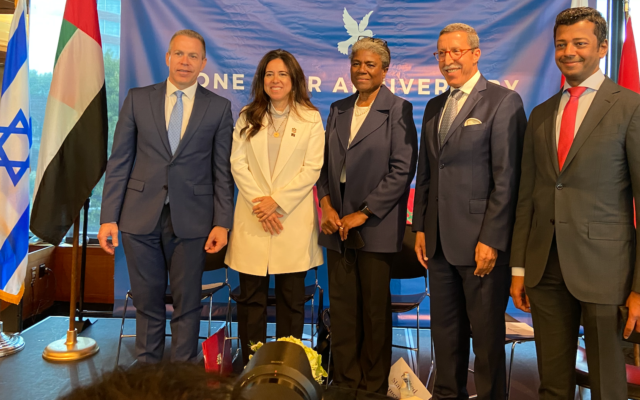
UN Ambassadors from Israel Gilad Erdan, from the UAE Lana Nusseibeh, from the US Linda Thomas-Greenfield, from Morocco Omar Hilale, and from Bahrain Jamal Al Rowaiei at a New York event marking the one-year anniversary of the signing of the Abraham Accords, September 13, 2021. (Jacob Magid/ Times of Israel)
While the senior Emirati official warned about what Israel stood to lose if it proceeded with annexation, she also made a point of highlighting what Jerusalem could gain if it again shelved the plan.
Arab countries, including Saudi Arabia, are still open to normalizing ties with Jerusalem, she indicated.
But they are conditioning such a move not just on the withdrawal of annexation plans but on Israel agreeing to establish a credible, irreversible pathway to a future Palestinian state. Still, they haven’t foreclosed the idea entirely, despite massive opposition to Israel’s prosecution of its nearly two-year war against Hamas.

Palestinian artists draw murals depicting the Dome of the Rock and the West Bank as part of an awareness campaign against Israel’s West Bank annexation plans, in Rafah in the southern Gaza Strip, on July 1, 2020 (SAID KHATIB / AFP)
“For every Arab capital you talk to, the idea of regional integration is still a possibility, but annexation to satisfy some of the radical extremist elements in Israel is going to take that off the table,” Nusseibeh said.
She asserted that Abu Dhabi did not come to this conclusion lightly.
“When Hamas tried to derail the Abraham Accords vision of regional integration with the October 7 terror attacks, we were firm in our response,” the special envoy said, highlighting the UAE’s immediate condemnation of the assault and recognition of Israel’s security concerns, while also “closely coordinating” to deliver more aid to Gaza than any other country.
“Over the last two years… our view was that the vision of the Abraham Accords remains pertinent — that you can’t let extremists set the trajectory of the region,” she said.

Permanent Representative of the United Arab Emirates to the United Nations Lana Nusseibeh speaks during a Security Council meeting at United Nations headquarters, December 22, 2023. (Yuki Iwamura/AP)
But with Israel taking increasingly far-reaching steps to entrench its presence in the West Bank and Gaza, she said, “we are worried that all of us in the Middle East are moving toward a point of no return” and that now is the time to reach out to Israelis before efforts to maintain Israel’s ties to regional partners are “irreparably damaged.”
“The Abraham Accords’ tenets of prosperity, coexistence, tolerance, integration and stability” have “never looked more under threat than [they are] today,” she said.
Nusseibeh assured Israelis that an off-ramp exists. “There is an outstretched hand, despite all of this misery, in the region to Israel. But, “annexation would withdraw that hand,” she said.
Top Stories
Smartphone overuse linked to a new pain the butt: hemorrhoids

Of all the crappy ways smartphones have affected our health, this one is a real kick in the pants.
A first-of-its-kind study links excessive scrolling on the phone while sitting on the toilet with hemorrhoids.
(Insert poo emojis.)
But, seriously. Sitting on an open bowl offers no support for the pelvic floor. That puts pressure on veins in the rectum, making them swollen and inflamed.
“The longer you sit on the toilet, the worse it is for you,” said Dr. Trisha Pasricha, director of the Beth Israel Deaconess Medical Center’s Institute for Gut-Brain Research Institute in Boston. Pasricha is also an author of the study, which was published Wednesday in PLOS One.
And smartphones are designed to keep people fixated for as long as possible. “They’re completely consuming to us in ways that wasn’t happening to the casual bathroom reader in the 80s,” Pasricha said. “They could much more easily put the newspaper down and get up and leave.”
Pasricha and colleagues surveyed 125 adults just before they were about to have a routine colonoscopy to screen for colorectal cancer.
Eighty-three (66%) of the participants admitted to using their phones in the bathroom — mostly to catch up on news of the day and scroll through social media.
Gastroenterologists performing the colonoscopies looked for evidence of inflamed veins, or hemorrhoids. People who said they took their phone into the bathroom were 46% more likely to have hemorrhoids compared to the others.
The risk remained even when researchers accounted for other factors associated with hemorrhoids, including dietary fiber, exercise and constipation or straining while using the toilet.
Hemorrhoids aren’t necessarily dangerous, but they can be bothersome, itchy and even painful. They also bleed sometimes, understandably causing concern and leading to nearly 4 million doctor’s office and emergency department visits a year.
Over time, “pelvic floor dysfunction can also lead to incontinence, worsen constipation and be associated with rectal pain,” said Dr. Reezwana Chowdhury, an inflammatory bowel disorder specialist at the Johns Hopkins University School of Medicine. Chowdhury was not involved with the new research.
What’s more, microscopic particles from urine and feces are sent flying through the air when a toilet is flushed. Taking a phone into the bathroom, Chowdhury said, “is kind of gross.”
Younger patients
In the new study, smartphone users in the bathroom tended to be younger, meaning adults in their 40s and 50s, versus people over age 60.
Dr. Robert Cima, a colorectal surgeon at the Mayo Clinic in Rochester, Minnesota, said he’s noticed an uptick in recent years of people coming in with hemorrhoids.
“I am seeing younger, earlier- and middle-aged people having more hemorrhoidal complaints, but I can’t tie it to smartphones,” said Cima, who was not involved with the new study. “Maybe it’s because they’re using smartphones or they have better access to care or they’re not eating appropriately.”
The 5-minute rule
The experts agreed that business on the toilet should take no longer than 5 minutes.
More than 37% of study participants who used a smartphone in the bathroom stayed for longer than that, compared to 7% of people who kept their phones out of the bathroom.
Pasricha and other experts do not advocate for taking a phone into the bathroom. If you absolutely must, set a timer.
“If the magic is not happening within five minutes, it’s not going to happen,” Pasricha said. “Take a breather and try again later.”
-

 Business5 days ago
Business5 days agoThe Guardian view on Trump and the Fed: independence is no substitute for accountability | Editorial
-
Tools & Platforms3 weeks ago
Building Trust in Military AI Starts with Opening the Black Box – War on the Rocks
-

 Ethics & Policy1 month ago
Ethics & Policy1 month agoSDAIA Supports Saudi Arabia’s Leadership in Shaping Global AI Ethics, Policy, and Research – وكالة الأنباء السعودية
-

 Events & Conferences4 months ago
Events & Conferences4 months agoJourney to 1000 models: Scaling Instagram’s recommendation system
-

 Jobs & Careers2 months ago
Jobs & Careers2 months agoMumbai-based Perplexity Alternative Has 60k+ Users Without Funding
-

 Education2 months ago
Education2 months agoVEX Robotics launches AI-powered classroom robotics system
-

 Funding & Business2 months ago
Funding & Business2 months agoKayak and Expedia race to build AI travel agents that turn social posts into itineraries
-

 Podcasts & Talks2 months ago
Podcasts & Talks2 months agoHappy 4th of July! 🎆 Made with Veo 3 in Gemini
-

 Podcasts & Talks2 months ago
Podcasts & Talks2 months agoOpenAI 🤝 @teamganassi
-

 Education2 months ago
Education2 months agoAERDF highlights the latest PreK-12 discoveries and inventions


